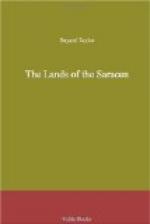Chapter IV.
The Dead Sea and the Jordan River.
Bargaining for a Guard—Departure from Jerusalem—The Hill of Offence—Bethany—The Grotto of Lazarus—The Valley of Fire—Scenery of the Wilderness—The Hills of Engaddi—The shore of the Dead Sea—A Bituminous Bath—Gallop to the Jordan—A watch for Robbers—The Jordan—Baptism—The Plains of Jericho—The Fountain of Elisha—The Mount of Temptation—Return to Jerusalem.
“And the spoiler shall come upon
every city, and no city shall escape;
the valley also shall perish and the plain
shall be destroyed, as the
Lord hath spoken.”
—Jeremiah, xlviii. 8.
Jerusalem, May 1, 1852.
I returned this after noon from an excursion to the Dead Sea, the River Jordan, and the site of Jericho. Owing to the approaching heats, an early visit was deemed desirable, and the shekhs, who have charge of the road, were summoned to meet us on the day after we arrived. There are two of these gentlemen, the Shekh el-Arab (of the Bedouins), and the Shekh el-Fellaheen (of the peasants, or husbandmen), to whom each traveller is obliged to pay one hundred piastres for an escort. It is, in fact, a sort of compromise, by which the shekhs agree not to rob the traveller, and to protect him against other shekhs. If the road is not actually safe, the Turkish garrison here is a mere farce, but the arrangement is winked at by the Pasha, who, of course, gets his share of the 100,000 piastres which the two scamps yearly levy upon travellers. The shekhs came to our rooms, and after trying to postpone our departure, in order to attach other tourists to the same escort, and thus save a little expense, took half the pay and agreed to be ready the next morning. Unfortunately for my original plan, the Convent of San Saba has been closed within two or three weeks, and no stranger is now admitted. This unusual step was caused by the disorderly conduct of some Frenchmen who visited San Saba. We sent to the Bishop of the Greek Church, asking a simple permission to view the interior of the Convent; but without effect.
We left the city yesterday morning by St. Stephen’s Gate, descended to the Valley of Jehosaphat, rode under the stone wall which encloses the supposed Gethsemane, and took a path leading along the Mount of Olives, towards the Hill of Offence, which stands over against the southern end of the city, opposite the mouth of the Vale of Hinnon. Neither of the shekhs made his appearance, but sent in their stead three Arabs, two of whom were mounted and armed with sabres and long guns. Our man, Mustapha, had charge of the baggage-mule, carrying our tent and the provisions for the trip. It was a dull, sultry morning; a dark, leaden haze hung over Jerusalem, and the khamseen, or sirocco-wind, came from the south-west, out of the Arabian Desert. We had again resumed the Oriental




